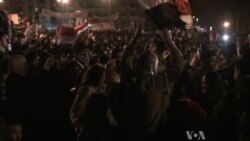CAIRO —
After a popular uprising in 2011 for democratic change, Egypt has had two military-led governments and one Islamist. Have Egypt's would-be modernizers failed?
Egyptians are good at taking to the streets. Millions rose up against President Hosni Mubarak and demanded freedom, dignity and social justice.
When the military council that replaced him hung on longer than promised, many of those same protesters came out to push for democratic elections.
And when the Islamist voted into office failed to meet expectations, they took to the streets again and President Mohamed Morsi was out.
Yet for all that mobilization on the ground, there is little evidence of the protesters' power in the halls of government.
Longtime activist Wael Khalil said that's the democracy movement's biggest failure. “We have been able to oppose things and change things, but haven't been able to force what we want,” he said.
Khalil knows that politics is messy and difficult and he's reluctant to engage in it. But he said people who want the 2011 uprising to succeed need to step forward. “More and more people [who] should really get their hands dirty and really look at it as we have to do it ourselves,” he said.
Those who did engage in politics, like members of the National Salvation Front, were widely criticized as ineffectual and prone to infighting.
“The opposition in Egypt over the past year has never been the kind of constructive opposition that was really, at heart, supportive of the revolution," said Rania al Malky, editor of The Egypt Monocle. "It never was."
The true opposition, she said, was consistently stymied.
“There were the revolutionaries on the ground who were infiltrated by the counter-revolutionaries who belonged to the former Mubarak regime.”
Those counterrevolutionary forces, she believes, have prevailed again, and she fears the situation is back to where it was before the 2011 uprising, with criticism of the leaders quashed.
Aside from the crackdown on the Muslim Brotherhood, journalists and anti-military activists have also been detained. Mohamed ElBaradei, the interim vice president and a leader of the National Salvation Front, resigned his post over the bloodshed. He has been charged with breaching national trust.
Khalil says Egypt has been through this before.
“We know that from Mubarak's years," he said. "They started it with the Islamists, in the '90s, and then the police state gets really ugly and brutal against everyone.”
Even as he listens to the government's defense of what it calls a “war on terrorism,” he remains hopeful. But he also says it will be difficult in the years ahead to make the slogan “freedom, dignity and social justice” a reality.
Egyptians are good at taking to the streets. Millions rose up against President Hosni Mubarak and demanded freedom, dignity and social justice.
When the military council that replaced him hung on longer than promised, many of those same protesters came out to push for democratic elections.
And when the Islamist voted into office failed to meet expectations, they took to the streets again and President Mohamed Morsi was out.
Yet for all that mobilization on the ground, there is little evidence of the protesters' power in the halls of government.
Longtime activist Wael Khalil said that's the democracy movement's biggest failure. “We have been able to oppose things and change things, but haven't been able to force what we want,” he said.
Khalil knows that politics is messy and difficult and he's reluctant to engage in it. But he said people who want the 2011 uprising to succeed need to step forward. “More and more people [who] should really get their hands dirty and really look at it as we have to do it ourselves,” he said.
Those who did engage in politics, like members of the National Salvation Front, were widely criticized as ineffectual and prone to infighting.
“The opposition in Egypt over the past year has never been the kind of constructive opposition that was really, at heart, supportive of the revolution," said Rania al Malky, editor of The Egypt Monocle. "It never was."
The true opposition, she said, was consistently stymied.
“There were the revolutionaries on the ground who were infiltrated by the counter-revolutionaries who belonged to the former Mubarak regime.”
Those counterrevolutionary forces, she believes, have prevailed again, and she fears the situation is back to where it was before the 2011 uprising, with criticism of the leaders quashed.
Aside from the crackdown on the Muslim Brotherhood, journalists and anti-military activists have also been detained. Mohamed ElBaradei, the interim vice president and a leader of the National Salvation Front, resigned his post over the bloodshed. He has been charged with breaching national trust.
Khalil says Egypt has been through this before.
“We know that from Mubarak's years," he said. "They started it with the Islamists, in the '90s, and then the police state gets really ugly and brutal against everyone.”
Even as he listens to the government's defense of what it calls a “war on terrorism,” he remains hopeful. But he also says it will be difficult in the years ahead to make the slogan “freedom, dignity and social justice” a reality.













